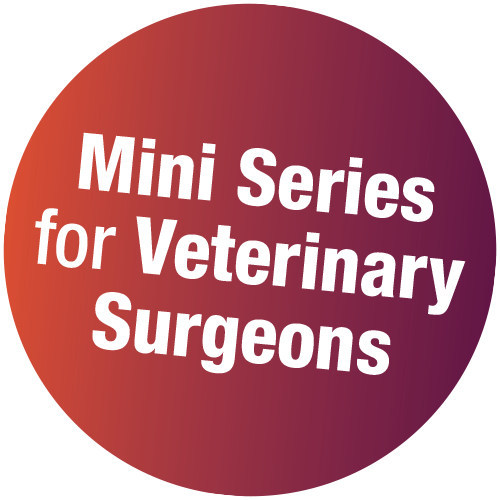MS136 – Liver and Pancreatic Disease Mini-Series
£447.00 (+VAT)
12 months access to recordings and course materials is included. Please note that these are webinar recordings and not live events. Full details on how to access the Mini Series will be emailed to you.
Liver and pancreatic diseases are common presentations in small animal practice and can be very challenging and complex cases. In this Mini Series we review the aetiology, diagnosis and treatment of the most common conditions, giving you confidence to develop a practical and logical approach using case based examples.
- Join Simon Tappin MA VetMB CertSAM DipECVIM-CA MRCVS for three 2-hour online sessions
- Comprehensive notes to downloaded
- Self-assessment quizzes to ‘release’ your 8 hours CPD certification (don’t worry, you can take them more than once if you don’t quite hit the mark first time)
- A whole year’s access to recorded sessions for reviewing key points
- Superb value for money – learn without travelling
- Watch the recordings on your iPad!
Programme
Understanding the Liver – How Can I Tell When It’s Unhappy?
We will start by looking at the liver, reviewing the clinical and biochemical parameters that help us understand the liver’s function, before exploring imaging techniques and hepatic ultrasound. We will discuss the pros and cons of hepatic fine needle aspirates and then why, when and how, we should take liver biopsies, and understand how to interpret the results. We will finish by looking at therapeutic options of liver disease, including the anti-oxidants, reviewing the evidence for their efficacy in small animal patients.
What you’ll learn:
- Review of the approach to patients with liver disease
- Assessment of laboratory findings; understanding biochemistry and evaluating liver function
- Understanding how and when imaging the liver is useful
- Knowing when should we take liver biopsies and how to interpret the results
- Review of therapy; when to use treatment such as antioxidants and the evidence of their effectiveness
Liver disease: what’s gone wrong and how can I help fix it?
The second session will review the major causes of liver disease, which we will breakdown according to the WSAVA guidelines. We will start by reviewing parenchymal diseases, again using a case based approach focusing on chronic hepatitis, cirrhosis and feline hepatic lipidosis. We’ll then move onto looking at the vascular disorders covering porto-systemic shunts, arteriovenous fistulas and portal vein hypoplasia, before covering diagnosis and management of the common hepatic tumours. We will finish but evaluating the consequences of liver disease, but discussing hepatic encephalopathy, portal hypotension and coagulopathies. This lecture will also touch on newer interventional techniques such as coil embolization for intra-hepatic proto-systemic shunts and intra-arterial chemotherapy for unresectable hepatic tumours.
What you’ll learn:
- Review of hepatic parenchyma diseases, including canine chronic hepatitis and feline hepatic lipidosis
- Hepatic vascular diseases – acquired and congenital porto-systemic shunts, A-V fistulas and portal vein hypoplasia
- Hepatic neoplasia review of common tumours and management options
- Understanding the consequences of hepatic disease: including coagulopathies, portal hypertension and hepatic encephalopathy
Sick as parrot, yellow as a canary: how to approach hepatobiliary and pancreatic disease
The last of the lectures will cover hepatobiliary and pancreatic disease. We will start by reviewing the biliary tract and looking at diseases of the gallbladder and bile duct, discussing the differences between cats and dogs, and reviewing what is meant by feline triaditis, using case examples to illustrate both a diagnostic and treatment approach. We’ll then look in detail at the causes of pancreatitis and discuss how we might be able to diagnose it with certainty! We’ll evaluate the treatment options and the evidence behind our recommendations. We’ll finish by taking a look at exocrine pancreatitis insufficiency and pancreatic neoplasia, reviewing the aetiology, diagnosis and treatment options.
What you’ll learn:
- Review of hepatobiliary disease, including cholangitis and mucocoeles
- Understanding what is mean by feline triaditis and how to treat it
- Knowing the causes, diagnosis and treatment options for pancreatitis
- Review of the aetiology, diagnosis and treatment of exocrine pancreatitis insufficiency
- Pancreatic masses causes, consequences and treatment options
The price includes all 3 sessions, notes and quiz – 8 hours of CPD
*No traffic jams, accommodation hassles, pet or childcare, rota clashes, locum fees ……….. just great CPD and a valuable ongoing resource.
Course Feedback :
“This course has improved familiarity and knowedge regarding liver disease diagnosis and treatment”
“There is lots of useful information relatable to things seen in practive every day. Helping me make better decisions with more confidence”
“I liked the way the diseases were broken down, approach to treatment given even when definitive diagnosis unable to be made”



